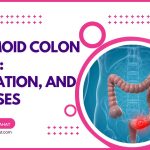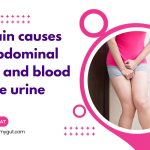5 Causes of Bubbling sensation in The Lower Abdomen: Doctor Explains.
Our content is not intended nor recommended as a substitute for medical advice by your doctor. Use for informational purposes only.
The bubbling sensation is often due to gas inside your colon. Gas can be a sign of maldigestion, gas-producing foods, or the presence of chronic infections or intestinal diseases.
Mild and intermittent bubbling sensations in your lower abdomen are often due to excess gassy foods and drinks. It is not a cause of concern unless you have other red-flag symptoms, such as:
- Significant abdominal pain.
- Diarrhea and/or constipation.
- Blood or mucus in stool.
- Nausea or vomiting.
- Fever.
- Weight loss.
- Passage of black stool (melena).
The idea is not to overthink this symptom as long as you get it is not severe, persistent, or associated with one of the red-flag symptoms.
Please use this article for informational purposes only; you cannot diagnose your condition alone. Consult your doctor if you are not sure about your symptoms.
1. Excess gassy foods and drinks.
Food is probably the most likely cause of the bubbling sensation in your lower abdomen. In addition, food can cause gas pain in healthy people if consumed excessively.
Gas-producing foods can cause symptoms without food intolerance or food-related diseases such as celiac disease and IBS.
The list of gassy foods that can cause a bubbling sensation in the lower abdomen is in the table below.
| ITEM | EXAMPLES |
| 1. Milk and dairy products | – milk, – ice cream, – and sometimes, cheese and yogurt. |
| 2. Vegetables | – Broccoli, – cauliflower, – Brussels sprouts, – onions, – leeks, – parsnips, – celery, – radishes, – asparagus, – cabbage, – kohlrabi, – cucumber, – potatoes, – turnips, – and rutabaga. |
| 3. Fruits | – Prunes, – apricots, – apples, – pears, – peaches, – raisins, – bananas |
| 4. Whole grains | -wheat, – oats, – bagels, – wheat germ, – pretzels, – bran/bran cereal |
| 5. Legumes | – Beans, – peas, – baked beans, – soybeans, – lima beans |
| 6. Fats | Fried and high-fat foods. |
| 7. Drinks | – Carbonated beverages, – beer, – carbonated medications |
| 8. Others | – chewing gum, – artificial sweeteners |
The symptoms of eating too many gassy foods include:
- Abdominal pain anywhere in your abdomen.
- Gurgling or bubbling sensation often in the lower abdomen.
- Passing too much gas (farting).
- Burping a lot.
- Bloating and distension.
- The symptoms typically start shortly after eating the offending food.
Learn more.
Treatment:
- Try to limit the consumption of gassy foods. Don’t cut them completely, but limit them to the maximum tolerable amounts.
- A simple food diary will help you identify foods causing your symptoms (by recording what you eat and associated symptoms).
- A trial of a probiotic supplement may help restore your health and make your gut more tolerant to such food (recommended for at least one-month duration. You can try famous probiotic brands such as Seed Synbiotics, Align probiotics, etc.
- NOTE, some probiotics may lead to exaggeration of gas and a bubbling sensation in the lower part of your belly.
2. Food intolerance.
Food intolerance is difficulty digesting certain types of food. It is a widespread condition affecting up to 20% of people.
With food intolerance, Your digestive system can’t break down and absorb the food. Consequently, food stays longer inside your stomach and intestines.
Bacteria inside your gut break down the undigested and unabsorbed food-producing too much gas.
The most widespread form of food intolerance is lactose intolerance. Lactose is a sugar found in milk and dairy products.
Food intolerance causes symptoms such as:
- Intense bloating and distension.
- Nausea and/or vomiting.
- Gurgling or bubbling sensation in the upper or lower abdomen.
- Diarrhea.
- Visible distension in the abdomen.
- Abdominal pain.
Food allergy is a less common type of food reaction. Unlike food intolerance, food allergy is an immune reaction to food that can lead to both food intolerance symptoms (digestive symptoms) and allergic symptoms (such as skin hives and lip swelling).
Both types of food reactions can cause bubbling sensations in your lower abdomen. They are not uncommon and often underdiagnosed by many.
The differences, symptoms, and common types are in the table below.
| Food intolerance | Food allergy |
| Affects 15-20% of the population | Affects nearly 2-5% of adults |
| Difficulty digesting certain types of food (not immune-mediated allergy). | An immune-mediated reaction to certain foods or food components. |
| Causes “recurrent acute” or “chronic” attacks of diarrhea, so much gas, and bloating. | Usually causes acute attacks related to the ingestion of offending food. |
| Intestinal symptoms: diarrhea, extensive gas, bloating, distension (looking pregnant), and abdominal pain | Intestinal symptoms are the same |
| No extraintestinal symptoms | Extraintestinal symptoms like rashes, urticaria, swollen lips or face, or severe life-threatening allergic reactions. |
| The severity of your symptoms is proportional to the amount you eat from the offending food. | Even trace amounts of the offending food can produce severe symptoms. |
Common offending foods:
| Common offending foods: (examples)
|
The only treatment for food intolerances and allergies is to cut or limit the consumption of offending. In the case of lactose intolerance, a lactase-enzyme supplement may help.
3. Irritable bowel syndrome (IBS).
Irritable bowel syndrome is another common cause of stomach gurgling and pain. It is a widespread disease. About 10-15% of people worldwide suffer from IBS (reference).
IBS is a functional disease of your digestive system. It can affect any part of your stomach (abdomen). Also, it can cause a bubbling sensation in the lower abdomen.
IBS is different from gas pain. IBS is more severe and more persistent. IBS pain is a long-term disease of flare-ups and remissions of abdominal pain. The frequency of abdominal pain is at least one day per week for several months.
IBS is diagnosed on a clinical basis, as there is no test to diagnose it.
Symptoms of IBS include (reference):
- Recurrent abdominal pain in attacks (at least one day per week).
- The abdominal pain should affect you for at least three consecutive months.
- The stomach pain and bubbling sensation are associated with defecation (Pain is relieved after passing stool or gas). However, passing stool can worsen the IBS pain in a smaller group of people.
- Bloating and distension.
- Changes in stool consistency (either hard stool or loose stool).
- Changes in bowel habits (constipation or diarrhea).
- Passing mucus in stool.
Learn how IBS is diagnosed HERE.
Best IBS Treamtments:
- Abdominal pain: antispasmodic such as Buscopan or mebeverine during the attack.
- Gas, bloating, and bubbling sensation: a peppermint oil supplement (Such as IBGuard ®) or simethicone (Gas-X ®) may help with the excess gases causing the bubbling sensation.
- Restricting high FODMAP foods and fruits.
- Diarrhea: antidiarrheals such as loperamide (Imodium ®) may help in severe cases. Some cases may respond to cholestyramine (Questran ®) due to the overlap between IBS and bile acid diarrhea.
- Severe Diarrhea attacks can also be treated with a two-week course of an antibiotic called Rifaximin (Xifaxan ®). It is a prescription medication that is approved for the treatment of severe attacks of IBS diarrhea.
- Constipation: Fiber supplements (such as Metamucil ®) and laxatives such as MiraLax ® may help. In severe cases, prescription medications such as lubiprostone are needed.
- A probiotic course (such as Seed Synbiotic or Align probiotic) may also help.
4. Gut Bugs (acute or chronic infections).
The majority of gut infections (gastroenteritis) are acute and self-limiting. Chronic infections also occur. Undiagnosed chronic gut infection can cause left-side stomach gurgling and pain.
Common causes of chronic gut infections:
- Parasites: Cryptosporidium, Cyclospora, Entamoeba histolytica, Giardia, and Microsporidia.
- Bacteria: Campylobacter, Aeromonas, Closteroides difficile, E. coli, Salmonella, and Shigella.
- Viruses: Norovirus or rotavirus.
- Unknown cause of chronic infectious diarrhea (a condition called brained diarrhea).
People with a weakened immune system (by disease or drugs) are at higher risk of chronic infectious diarrhea, stomach gurgling, and pain.
Treatment:
Bacterial gut infections is treated with antibiotics such as ciprofloxacin and metronidazole (Flagyl).
Viral infections are often self-limiting, a probiotic may help reduce the duration of symptoms (such as gas and bublling).
5. Female-only causes.
The female reproductive organs lie in the pelvis; any diseases or conditions affecting the female reproductive system can cause abnormal sensations in the lower abdomen (such as pain, tightness, or bubbling sensations.
Common conditions that can lead to a bubbling sensation in the lower abdomen include:
- During menstruation and the premenstrual period (premenstrual syndrome.
- Ovulation, ovarian cysts, inflammation of the ovaries, or cancer.
- Urinary bladder inflammation (cystitis), stones, or tumor.
- Early pregnancy.
- Pelvic adhesions due to previous operations.
- Pelvic congestion syndrome.
The article explains these conditions: The causes of lower abdominal tightness in females.
6. Others.
The below condition can cause a bubbling sensation in your lower abdomen. However, they are either less common or don’t present with an ISOLATED bubbling sensation in the lower abdomen (More complex symptoms).
- SIBO (small intestinal bacterial overgrowth).
- Chronic functional constipation.
- Certain medications, such as laxatives, overdose.
- Bile acid diarrhea (excess bile acids cause severer diarrhea with urgency, the disease responds well to bile acid binders such as cholestyramine (Questran)).
- Crohn’s disease.
- Ulcerative colitis.
- Celiac disease.
- Colorectal cancer.
- Diverticular disease.
- Any pelvic or abdominal masses (benign or malignant tumors).
- Also, stress and anxiety can disturb your digestive symptom. For example, many people experience pain or bubbling sensations in the lower abdomen during stress.
- Cystitis.
When to see a doctor for Bubbing lower abdomen?
- Persistent lower abdominal pain and bubbling feeling.
- Associated severe or prolonged diarrhea.
- Blood in stool
- Weight loss.
- Menstrual irregularities.
- Nausea or vomiting.
- Unexplained fever.
MORE:5 Causes of Lower Abdominal Pain When Coughing & When to Worry
- Evidence-based
- Written by a doctor.






